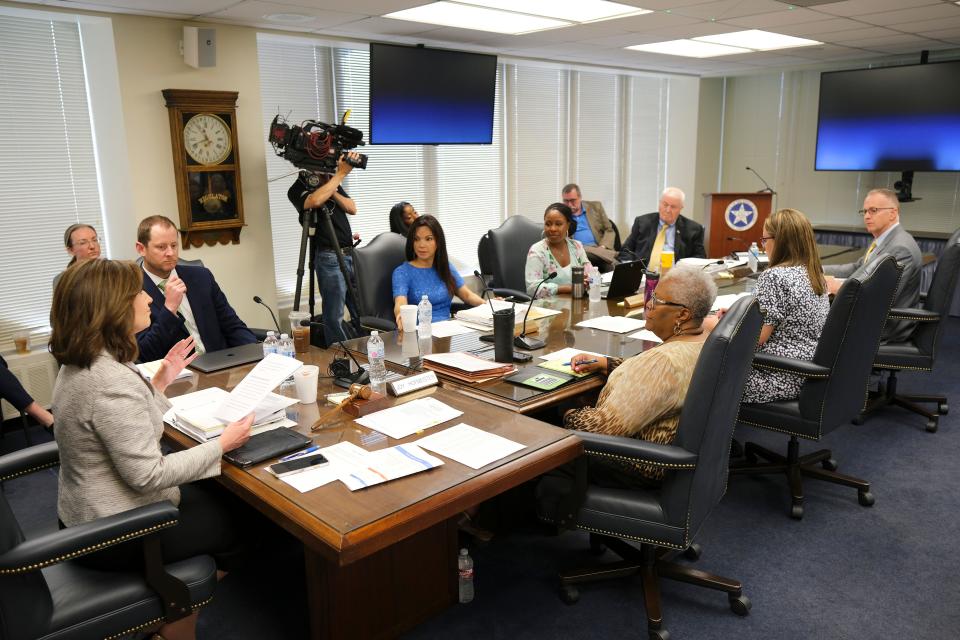On new law about teaching race, Gov. Kevin Stitt says some are 'blowing this out of proportion'
As educators in Oklahoma have expressed concern about what they can teach about race and history because of a law banning certain concepts, Gov. Kevin Stitt said some are overreacting.
“People are kind of blowing this out of proportion,” Stitt told The Oklahoman during an interview this week.
House Bill 1775, which was passed by Republican lawmakers last year and signed by Sitt, prohibits the teaching that “one race or sex is inherently superior to another,” and that “an individual, by virtue of his or her race or sex, is inherently racist, sexist or oppressive.”
While the bill does not mention “critical race theory” by name, it was championed by supporters as a ban on the controversial academic theory that, at its core, teaches that racism goes beyond personal prejudice and can be systemic.
After the state Board of Education recently voted to reduce the accreditation status of Tulsa and Mustang school districts, teachers have expressed concern that seemingly standard lessons about race and culture will be deemed a violation of the law.

More:After Uvalde shooting, Oklahoma Gov. Kevin Stitt issues executive order on school safety
Stitt said he supported the state board’s recent action and didn’t see the punishment as too severe.
“I support the school board. ... You have to follow the law,” Stitt said. “But here’s the deal, what did (the board) do? They just gave them a warning, a document that’s on a file, (that says) don't do it again. It's not the end of the world for those school districts.”
Mustang superintendent says action by state board was unnecessary

In a letter sent to the state Board of Education this month, Mustang Superintendent Charles Bradley noted there is no appeals process outlined in HB 1775, but he requested a meeting with board members to discuss his district's punishment.
Bradley said he was unaware that Mustang’s accreditation status was going to be discussed at last month's board meeting and the vote seemed to ignore the quick steps the district took to address the situation.
“This was a singular isolated incident by a single employee, out of over 1,600 employees, which has now led to severe consequences for an entire district of over 13,000 students,” Bradley wrote. “I fail to see any incentive for a school district to investigate concerns and remedy them when this is the outcome.”
Mustang officials said the incident occurred when a student reportedly felt uncomfortable during a class activity that asked students whether they had experienced discrimination.
More:Gov. Kevin Stitt rides horseback, signs bill naming American Quarter Horse official state horse
HB 1775 states that a student shouldn't feel "discomfort, guilt, anguish or any other form of psychological distress on account of his or her race or sex."
The state board took harsher action than the state Department of Education had recommended, voting on a reduced accreditation status that brings extra state oversight and sets the district up for an even tougher penalty if another violation occurs.
"Accredited with warning is sufficient in this case because we need to send a message," board member Estela Hernandez, who voted in favor of the reduced accreditation, said during last month's meeting.
Oklahoma educators worried law makes teaching history a tougher task
Supporters of HB 1775 have said teachers shouldn't worry about the law as long as they stick to state-approved lessons.
"This bill clearly endorses teaching to the Oklahoma academic standards, which were written by Oklahoma educators," Stitt said last year when he signed the bill.
But educators and school leaders have said the message sent by the state Board of Education's vote is worrisome and there is fear that teaching Oklahoma standards could still be interpreted as a violation of HB 1775.
Wyjuana Montgomery, a school board member of Epic Charter School, gave an example of a new academic standard that requires schools to teach about the Holocaust in a way that develops a dialogue on the ramifications of bullying, bigotry, stereotyping and discrimination; and also encourages tolerance of diversity.
“Where I worry about our teachers, you've got one (law) that told you not to cause discomfort,” Montgomery said about HB 1775, speaking at a recent board meeting. "And then, you have another one that's telling you to develop dialogue about bullying, bigotry, stereotyping and discrimination. All of those things may cause discomfort.
“I feel like one law was written from one angle, and the Holocaust (policy) was written from another. But a teacher could be caught up in the web either way.”
Critical race theory became a political target for many conservatives

HB 1775 stemmed from a growing political movement within conservative circles that claimed schools were indoctrinating children, and that critical race theory, which is a more than 40-year-old academic theory, was causing white students to feel guilty.
While critical race theory and its concepts are not banned by HB 1775, supporters of the bill have claimed otherwise.
Critical race theory includes a core belief that systemic racism exists and that individuals, even if they personally do not embody prejudice towards another race, can participate in that system and should consider the role they play.
In 2020, Stitt hosted a forum with his wife, Sarah Stitt, that promoted concepts of critical race theory.
More:Kevin Calvey, Gayland Gieger head to Aug. 23 runoff in GOP race for Oklahoma County DA
"What conversations should we be having (with children), what should we be teaching them, what should we be exposing them to?" Sarah Stitt asked the panel.
Herbert Cooper, the pastor of People's Church in Oklahoma City, said it was important, especially for white people, to acknowledge "racial injustice."
"We can't be a part of fixing a problem if we don't acknowledge it and I know that can be tough for some people," said Cooper, who is Black. "I would say this to all of our white Oklahomans, not to put you on a guilt trip, not to make you feel bad, but so we can partner together to move forward.
"Something for all of us to do is practice cultural humility ... to realize you walk into a situation with a bias, with a perspective, and that oftentimes the person of a different skin color probably doesn't have your same bias and perspective. What we have to do is practice cultural humility to say my perspective is limited."
"Amen," Sarah Stitt said in response.
This article originally appeared on Oklahoman: Oklahoma Gov. Kevin Stitt says some overreacting about teaching on race
